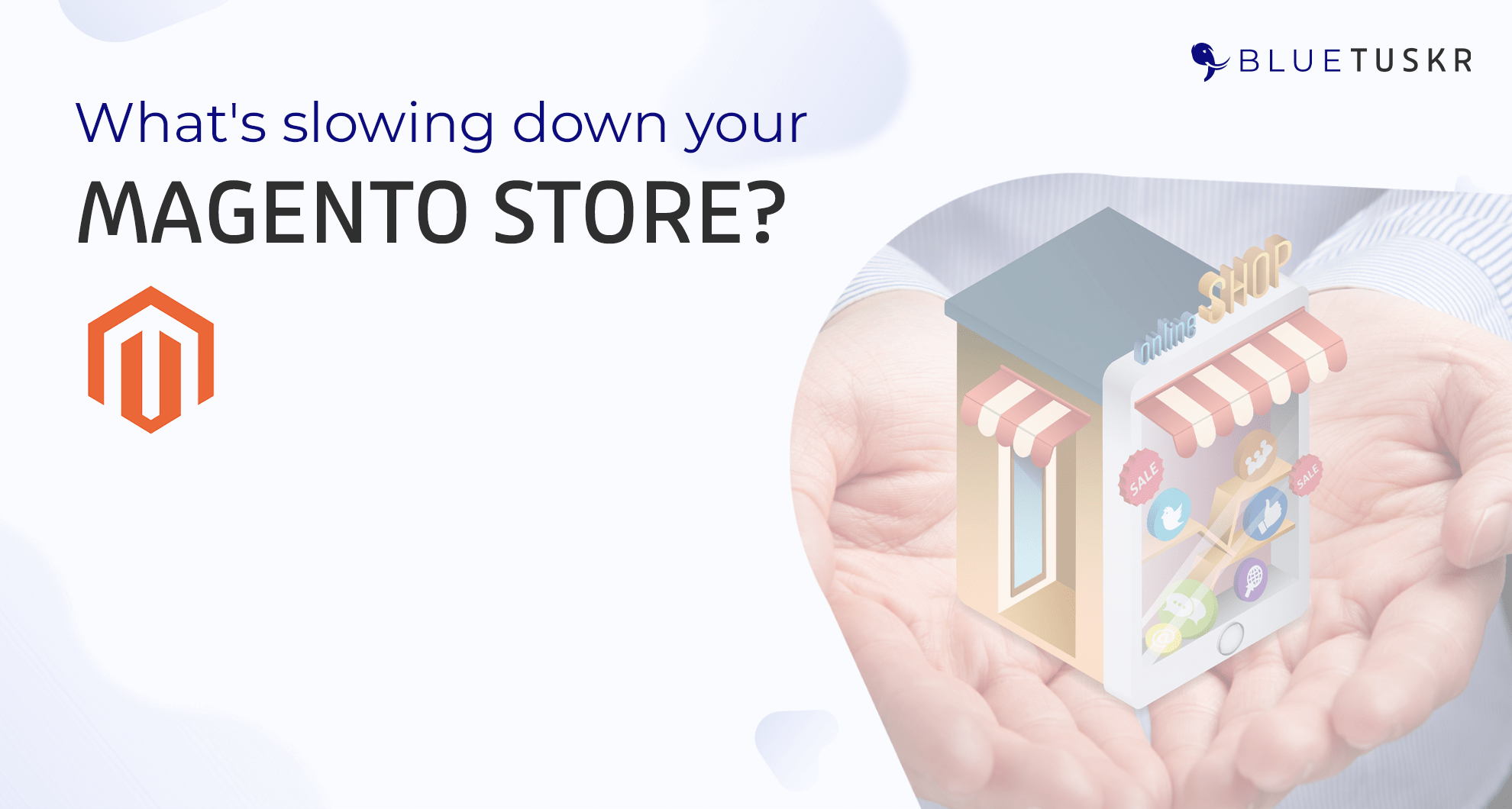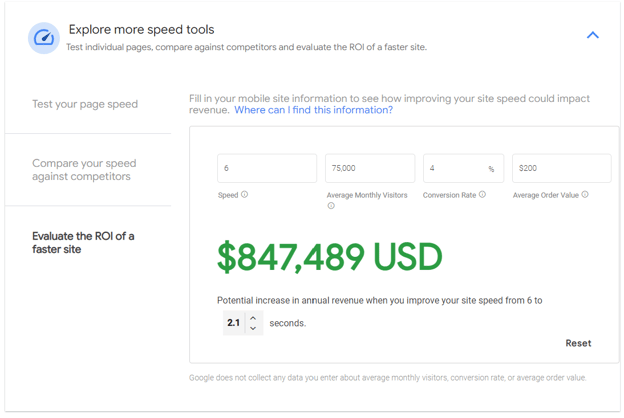
Why Does E-commerce Speed Matter? - Updated 2023
It’s more than just bravado or bragging rights. e-commerce loading speeds have a direct impact on e-commerce KPIs, and ultimately revenue. As a rule of thumb, the slower your website is, the higher your bounce rate is and the lower your conversion rate is.
Furthermore, tech giants like Google use speed as a ranking factor. This has been publicized a lot since Google announced the release of Core Web Vitals. This set of tests quickly and easily verifies if webpages within your website are user-friendly, or if they’re slow and hard for consumers to use.
So, speeding up your web pages can give your SEO campaigns an extra edge. They can also help your Google Ads quality scores, which impact the success of your SEM campaigns.
Google has gone so far as to create a calculator to help you understand the value of speeding up your website:

Source: https://www.thinkwithgoogle.com/feature/testmysite/
The Most Common Magento Speed Factors
At the heart of it, your Magento site consists of files and a database that are hosted on one or more web servers. If your coding is optimized, and your servers are configured with speed in mind, you can expect some pretty great results. What to consider:

Coding & Debugging
Many store owners start by reviewing all of the extensions that they’ve added to their stores and removing any that are no longer valuable. Having excess code running certainly has the propensity to bog down page loading speeds.
Another common task is to review your coding and database for errors or issues which are impacting your website’s speed and availability. While you can start with your Magento error and exception logs and external speed tests like GTMetrix, many developers leverage more advanced tools like New Relic, which help to identify scripts that are causing issues and bottlenecks. These issues will often impact the performance of your site, and can also hurt the scalability of your website. In essence, inefficient code and excess unused extensions will cause bottlenecks, overutilize server resources, and muck up your website’s performance.
Perhaps the biggest coding factor that impacts the loading of your Magento website will be the frontend theme. Many Magento 2 sites use Luma or a variation of this theme, which launched with Magento 2 back in 2015. Luma is technologically outdated and can make it hard, if not impossible, to hit the speed and core web vitals scores that you’re seeking. As a result, many merchants are switching to more modern themes, like Hyva, which are engineered around new standards and best practices.

Servers & Caching
Lots of companies advertise offers of fast Magento hosting. However, they rarely live up to their hype. There are several things that your web host should assist with in order to deliver the super-fast loading speeds that you’re seeking, such as:
- A dedicated, single-tenant hosting environment that’s architected and optimized for your specific Magento website.
- Specific workload-optimized hardware, from CPUs, to SSD drives.
- Properly configured caching, like Varnish and Redis.
- Content Delivery Network (CDN), like Cloudflare, to further optimize images and files, and load static content from an edge network.
One core difference between hosting providers is management and support. Many hosts that offer Magento environments will simply spin up a prefabricated environment and hand it off to you so that you can try to meet your goals with it.
Here are some signs that the host you’re considering is indeed ready to help you hit your speed goals:
- They will help to migrate your site to their infrastructure and assist with optimization and user-acceptance-testing (UAT).
- They provide dedicated account managers and proactive monitoring to ensure speed, security, and overall site performance are managed.
- They have case studies, establishing the speed improvements that they’ve made for real, verifiable merchants.
- They will configure, maintain, and manage your complete hosting stack, including web application firewall, intrusion detection systems, malware scanners, off-server backups, etc.
Finding the right hosting partner can alleviate many Magento performance and reliability issues.

Kicking Things Up A Notch
Just because there are elements of your website that you haven’t been able to optimize in the past, doesn’t mean that you won’t be able to as you move forward. Here are some examples:
Image Optimization
While your content delivery network (CDN) may include basic image optimization, there are solution providers like ImageEngine that focus on nothing but image optimization, and can potentially provide significantly better loading speeds for images.
Caching Dynamic Content
Content delivery networks excel at caching copies of static files, like images, that don’t change frequently. However, there’s still lots of dynamic content that needs to be transmitted from your hosting servers each time a visitor navigates to your website. There are, however, solution providers like Zycada which can use bots to cache dynamic content at the edge too.
Third-Party Apps & Integrations
Your Magento store is probably connected with a variety of 3rd party apps. These may be related to online ratings and reviews, loyalty programs, live chat platforms, marketing enhancements, shipping offers, or various other solutions. When you select such platforms, you’re probably not thinking about speed impacts - but it would be ideal if you were. Solution providers like Yottaa help you to analyze and control 3rd party apps that load with your website.
Browser Extensions
When you run a speed test using Google’s Lighthouse tool, you may notice a warning asking you to run the tool from an incognito browser window. That’s because extensions installed in your web browser will impact loading speeds. Historically, this is something that website owners simply had to live with, but there are now providers like Namogoo that allow you to split test blocking different extensions, and ultimately block the ones that are negatively impacting your eCommerce conversions and revenue.
In many cases, your web host will have partners to recommend to address areas of concern like Image Optimization and Caching Dynamic Content, greatly simplifying your rollout of such solutions.

The Trifecta
Here’s where you’d expect most articles to sum things up talking about products or services. However, that’s not typically what moves the needle the most. Magento loading speeds are highly influenced and impacted by 3 parties:
(1) You, as the owners of the Magento store,
(2) Your web developer(s), and
(3) The team that’s proactively managing your Magento web hosting round-the-clock.
At the beginning of this article, we mentioned that speeding up your Magento store doesn’t need to be stressful. Indeed, if these 3 parties are communicating effectively and working as a team, your Magento loading speeds should be good if not phenomenal.
Regardless of what website platform you’re using, latency and speed issues require more than tools to resolve. They require expertise. However, when you bring Magento Open Source or Adobe Commerce into the mix, it’s crucial to have experienced industry veterans helping to manage the fine-tuning of your site.
 About the Author
About the Author
Robert Rand, Director of Partnerships & Alliances, JetRails
Robert Rand is the Director of Partnerships & Alliances at JetRails, a mission-critical website hosting service. Robert has over a decade of experience in helping merchants benefit from sound website and digital marketing strategies, assisting organizations of all types and sizes to grow and succeed online. Robert is a frequent author and thought contributor in the website industry and the host of The JetRails Podcast.
Are you interested in being a guest on the BlueTuskr E-commerce Blog? Click here for more information.
Connect With Us
Recent Post

.png)








Tell us what you think!